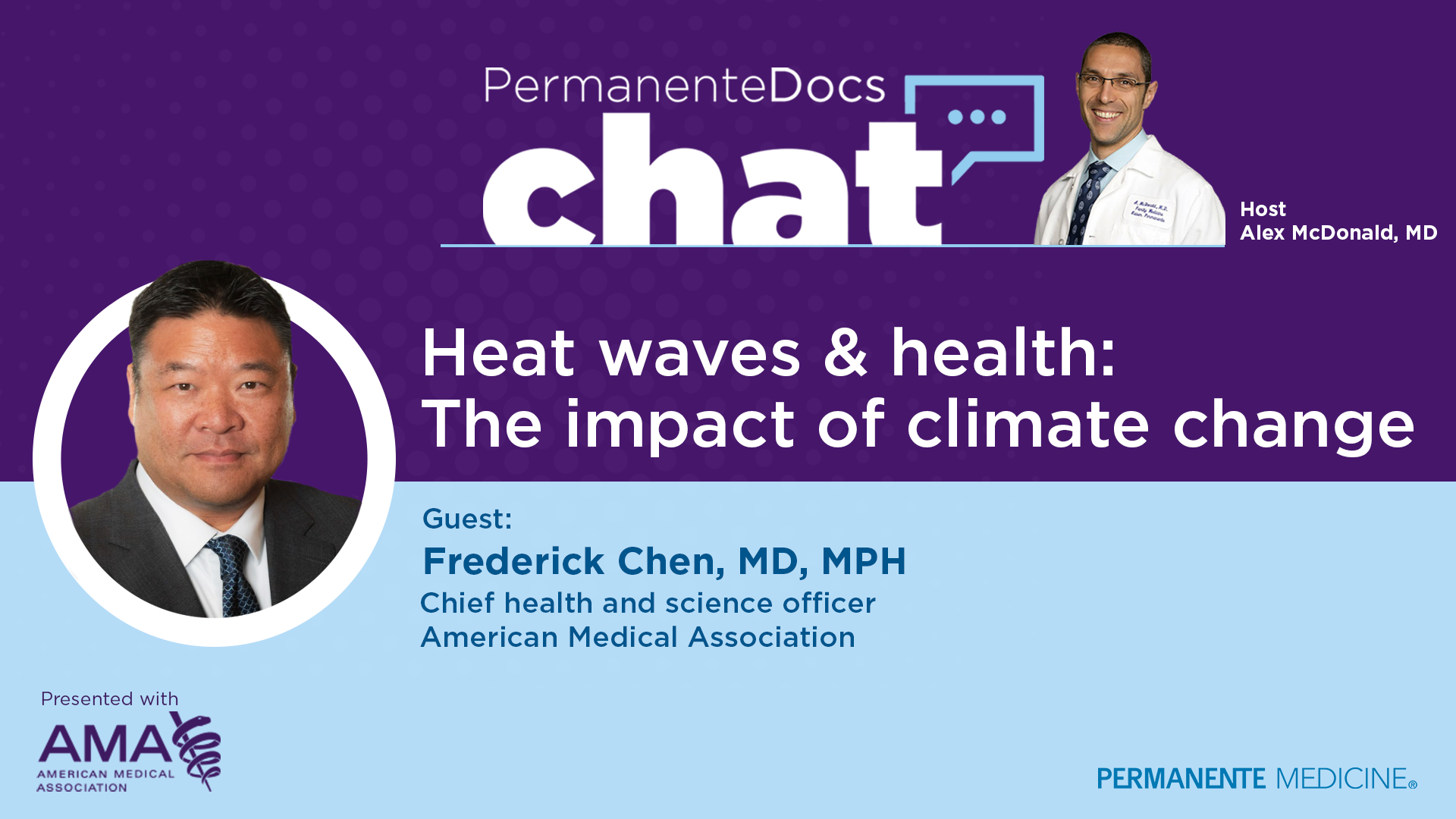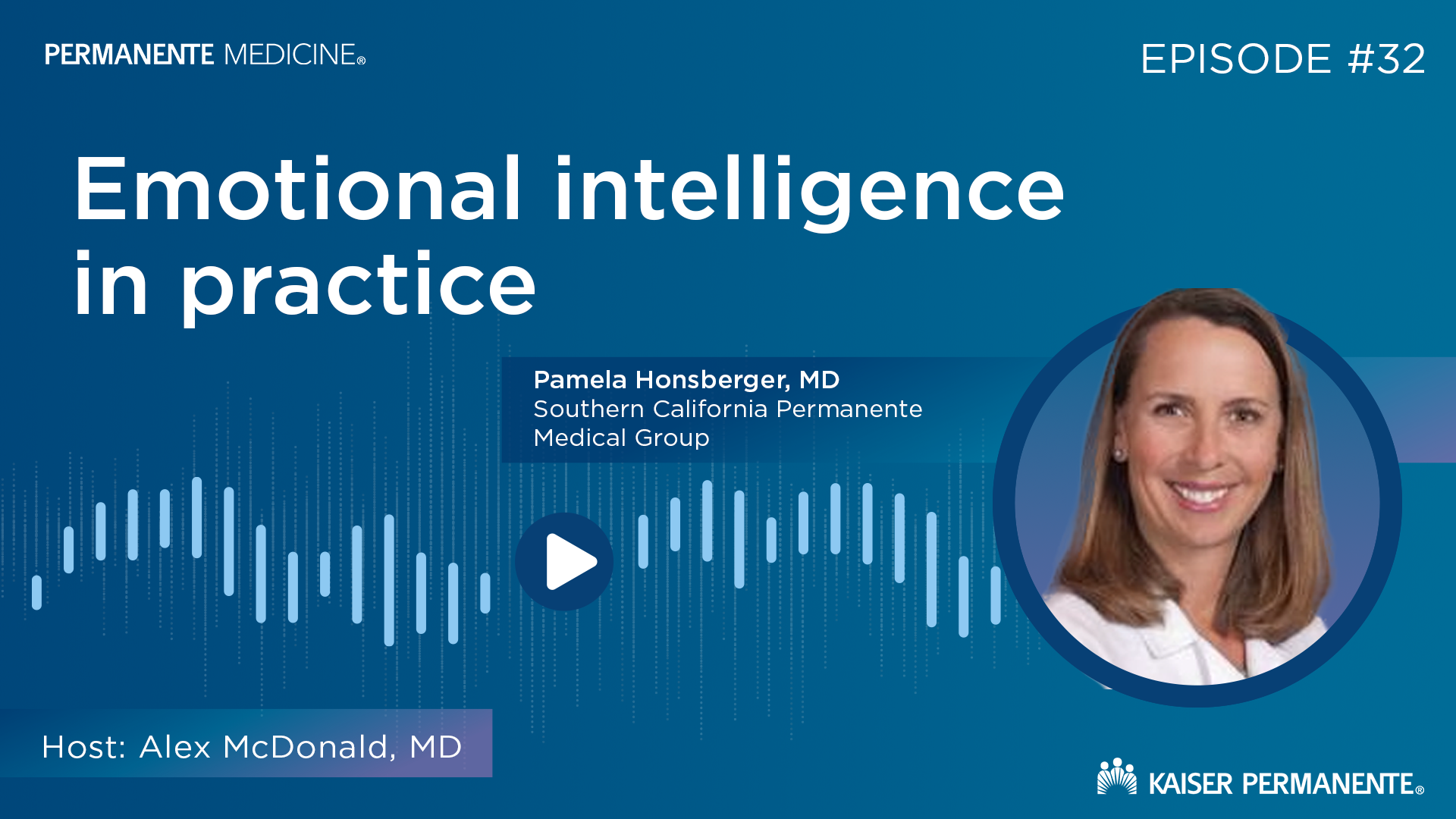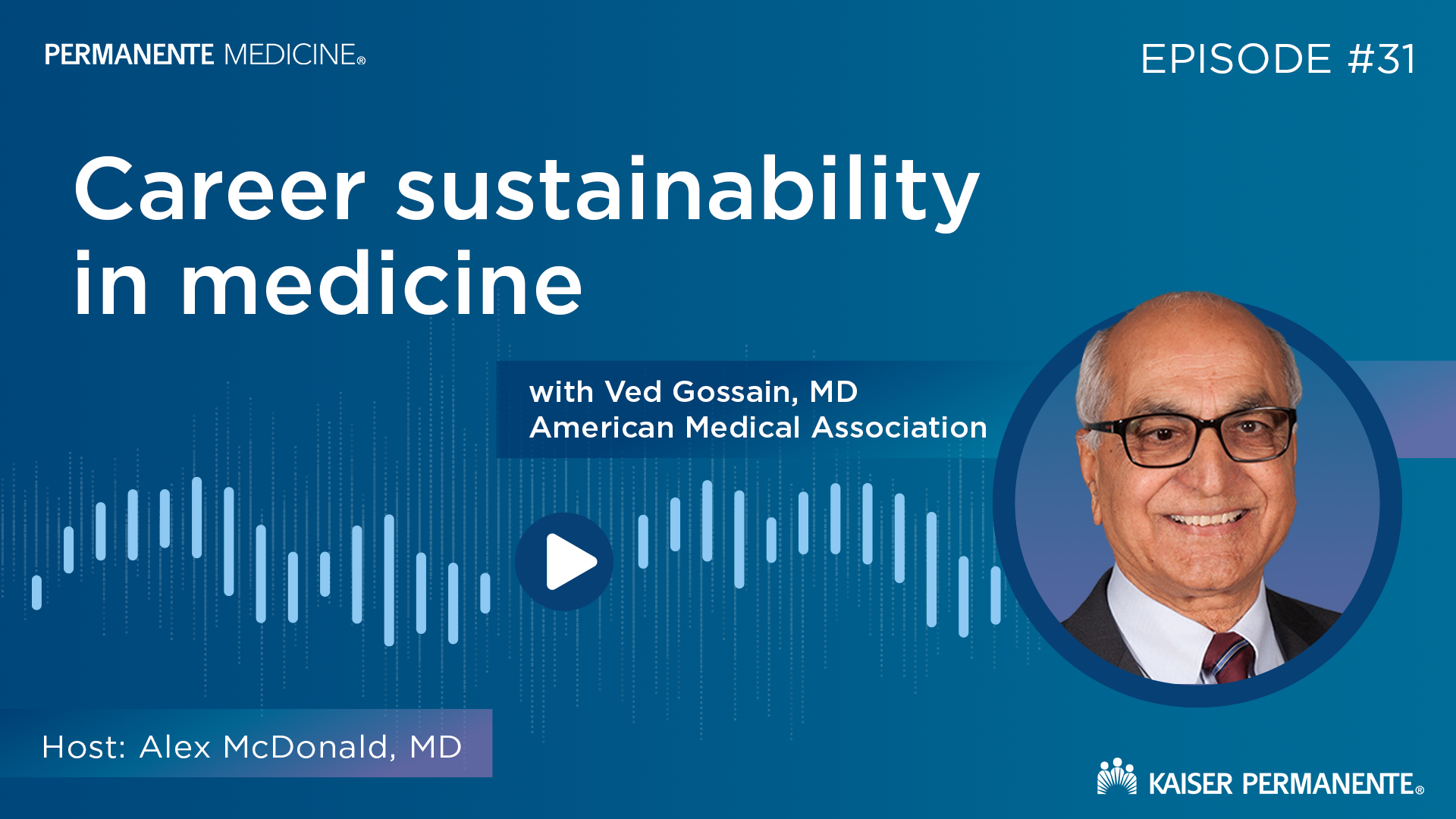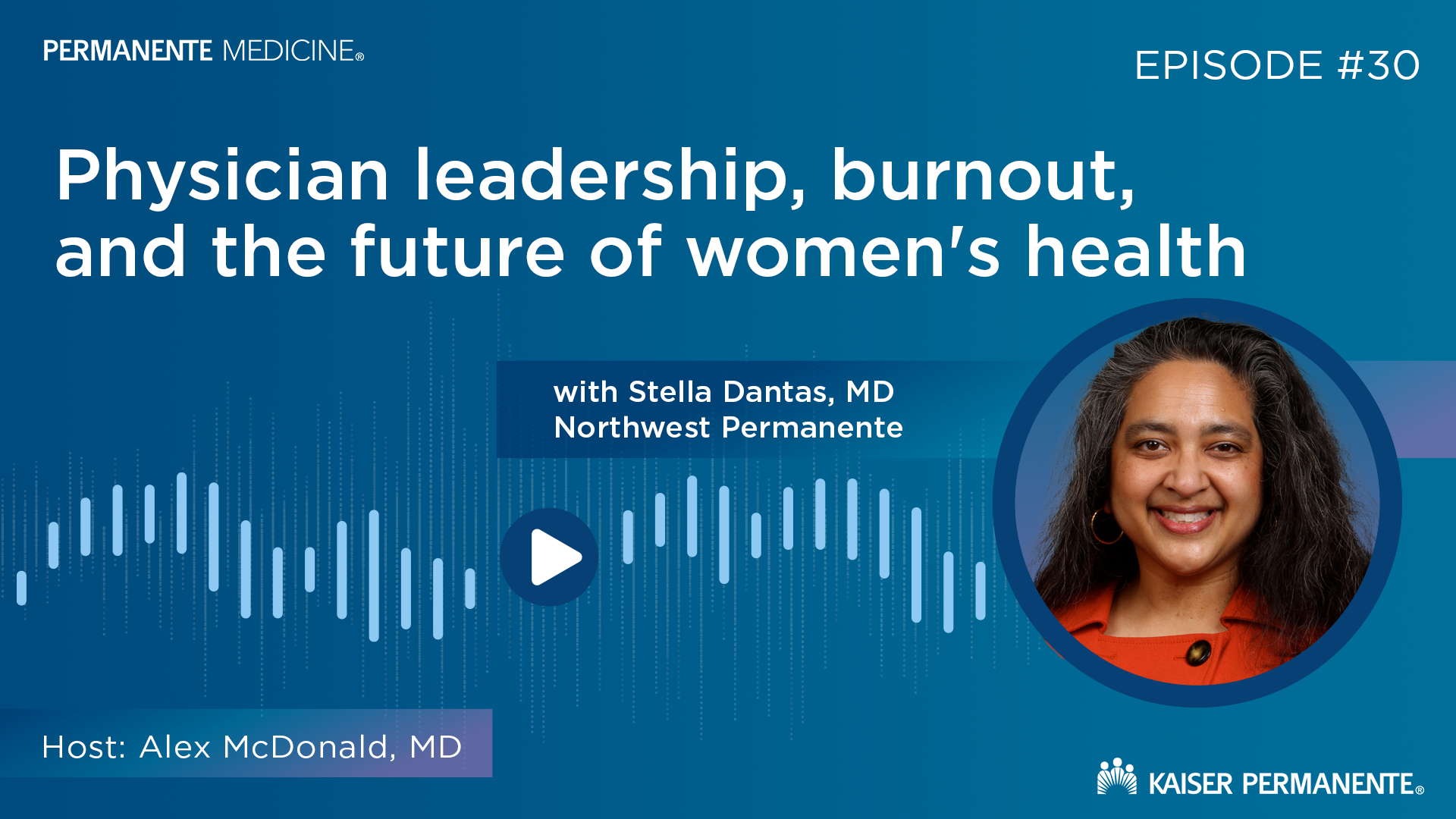Discover the importance of emotional intelligence in health care with insights from Pamela Honsberger, MD.

PermanenteDocs Chat on heat waves and health
Host Alex McDonald, MD, engages in a conversation with Frederick Chen, MD, chief health and science officer at the American Medical Association (AMA). Together, they explore the link between climate change and public health, shedding light on the impacts of extreme weather events, vector-borne illnesses, and the implications for patients of all ages. Dr. Chen shares his expertise on the physician’s role in preparing for climate-related challenges, educating patients and communities, and advocating for health-focused climate solutions.
Guest
- Frederick Chen, MD, MPH, chief health and science officer, the American Medical Association.
Watch the full replay video or listen to the podcast above.
Podcast transcript
Transcript is autogenerated. Although edited for clarity, it should not be considered an exact replication of the podcast and may also be updated as needed.
Alex McDonald, MD: Hello, everyone! Welcome to this week’s PermanenteDocs chat. Thanks for joining from wherever you may be watching, listening, signing in. I’m your host, Alex McDonald. I practice family and sports medicine here in Fontana, California, as part of the Southern California Permanent Medical Group. Today’s chat is another collaboration with the American Medical Association, which I’m very excited about. Today we’re discussing health and the climate, the warming climate, with Dr. Frederick Chen, who is the chief health and science officer at the American Medical Association. Welcome, Dr. Chen.
Frederick Chen, MD: Great, Alex! Call me Freddie. It’s great to be here. Thanks so much for having us.
AM: Awesome. Well, if you’re listening to this live on the webinar, if you have questions, you can drop them in the Q&A. We’ll try to get to as many of those as we can, but this is only a 20-minute discussion so get your questions in early. We’re just going to jump right in. Freddie, tell us who you are and what you do.
FC: Yeah, and again, it’s great to be here. My name’s Freddie Chen. I’m a family physician trained at University of California, San Francisco, so shout out to some of my colleagues from there. Then I came up to Seattle and did my family medicine residency at the University of Washington. I pretty much stayed there for the last almost 25 years, where I was the chief of service at Harborview, our county hospital. Most of my academic work was in health policy and public health, with a focus on rural and physician workforce issues. And for the last year, I moved over to the American Medical Association, which is based in Chicago, and I’m the chief health and science officer there. I oversee public health, science, and ethics for the AMA.
AM: Wonderful. Well, thank you so much for being here. We could go down lots of rabbit holes together regarding health policy, public health, and family medicine, but we’re going to try to keep this focused on health and the climate today, so just correct me if I go too far off course. Now, there have been lots of weather events in the news recently — the Maui wildfires, the wildfires in Canada as well as Washington, and, most recently, the first tropical storm here in Southern California in 80 years. How are these severe weather events affecting people, affecting health, and affecting how physicians and the health care infrastructure can respond?
FC: That’s exactly what we’re here to talk about today. I’ll start by acknowledging all of those extreme weather events you just mentioned. During the pandemic, I actually served for a time as a medical director for Hawaiian Airlines. So, the folks I worked with there were particularly impacted by the wildfires in Maui, and my thoughts go out to them. The governor there, by the way, is a family physician as well, Dr. Josh Green. He’s the only physician governor in the country, and he and his team have been super engaged with that. I was just in Chicago yesterday; it was 102 degrees. I came back to Seattle, and there’s wildfire smoke here too. So, all of those things you just mentioned are top of mind certainly for us at the AMA and Kaiser Permanente, but our patients and our communities as well. I think one of the main messages we have today is just, as physicians and as leaders in our health care organizations, our attention on climate change and on these health effects is important and valuable. It really helps add to the conversation around it, the attention on these problems. It really adds a unique medical and health aspect that makes it real for people. We talk a lot about the asthma effects, infectious disease effects, cancer and mortality effects. There’s an element of that that we bring legitimacy to and science to, and we can really help contribute to the national conversation.
AM: Yeah, that’s such a good point. I think a lot of physicians are very passionate about this and understand the direct link between the weather and the climate and health — asthma, respiratory illnesses, heat illnesses obviously are some of the biggest things. But there are also many physicians who say, “Look, this isn’t something we should be focused on. We should be focusing on more traditional issues as physicians within organized medicine.” What do you say to those physicians who maybe don’t think this is something we should be advocating for?
FC: You know, we used to say that about things like smoking, too. And so, it is definitely part of our evolution, I would say, as an organization. When we went back and looked at AMA’s history in environmental health, we didn’t call it climate change issues back then, but it goes back more than 100 years — water safety, air safety. So, it’s actually been a long-standing interest as part of our mission in the betterment of public health, so in that part there’s been a long-standing recognition at the organizational level. But yeah, I agree. It’s the same reason why we had a hard time getting our heads around social determinants of health. But now, nobody would argue that racism, housing, education, income, and poverty all have effects on people’s health, and climate change is definitely one of those. I would also add that it’s not just a small group of your physician colleagues who are engaged in this and interested — it’s a majority of them. And your patients, as we were just talking about, are really affected by it and want to hear what you have to say about it.
AM: Yeah, and I’ve had conversations with colleagues who feel maybe this isn’t something we should be delving into. I’ve seen them definitely shift positions over time and understanding as a family physician, my job is to prevent illness, and if it’s not safe for you to go outside and go for a walk — if the ozone levels are dangerous for people with respiratory issues — how can we ignore that when it’s directly impacting their health? So, I’m glad to hear that even from your perspective, you think the majority of physicians understand and want to address this issue. What are some of the main effects that you’re seeing from your role at the AMA that are the most pertinent health effects directly impacting our patients from some of these more severe weather events?
FC: The Centers for Disease Control and Prevention’s (CDC) Morbidity and Mortality Weekly Report came out with a report around early June when the wildfire smoke affected East Coast cities, which, by the way, gets a lot more attention than when it happens on the West Coast. But on those days that had the highest, the worst air quality days, those saw an 80%, almost a doubling, of Emergency Department visits and asthma-related visits. So, the respiratory and air quality pieces are an easy and most common example. I’ve been really focused because our purview in public health includes a lot of infectious disease stuff — vector-borne illnesses, malaria cases, dengue cases, Zika. So, mosquito and tick-borne illnesses, as the climate shifts, as the temperature shifts, we’re going to see more of those. And that’s going to be a piece of it. And then, as you saw with the wildfires, this is also environmental disaster medicine-type stuff, right? It’s not just in the world of emergency medicine but how do you prepare your communities? How can you be better prepared? And then, after something happens, where’s the access to health care there? And what are those resources available? So, it really is broad and far-reaching in terms of all different aspects of health and health care.
AM: It’s funny you should bring up the vector-borne issue because as many of you know, I got a whole bunch of rain at my house this past weekend here in Southern California, which is very unusual for this time of year. And there were mosquitoes in my house today, actually this morning my son had a bunch of bug bites, and I found some puddles in the backyard. We never have mosquitoes this time of year in the desert here in Southern California. So, I can speak personally to that one — or more probably, my son can speak personally to that one.
FC: Exactly, the hurricane, the storm, you know, we just don’t have to go very far anymore for examples and for reasons why we have to be prepared and be able to talk about and be able to engage in that.
AM: Yeah. Tell us more about heat effects, particularly on our elderly and very young pediatric population, how some of those heat illnesses and heat effects can really become more problematic.
FC: The acute piece of that, of course, are these heat-related illnesses and heatstroke that we’ve seen and continue to see. There’s a heat dome over the Midwest right now, and you see these tremendous spikes in temperature that are correlated with mortality spikes. So, it’s really helping people think about how to cope with heat, right? And how to prepare for it, what are the resources. I know our clinics, we talk about cooling centers when those get opened up and those kinds of things. But then, identifying, that’s the clinical level of it, right? How do you manage these heat-related illnesses? I think the bigger picture then is also what are the sequelae of them? What are the other long-term effects of a warming planet?
AM: How can physicians better educate themselves to understand some of these impacts of the climate and health? And how can they help their patients and their communities prepare? Because I think preparedness is obviously a huge component.
FC: Yeah, you know, the good news is, because of this increased attention, we’re getting better and better resources for teaching physicians about where you can go out and learn. The AMA’s Ed Hub has a number of continuing medical education (CME) materials around climate change that you can look at. We’re part of a terrific medical society consortium on climate and health, and that group has a great website we can share with you. They’ve got ton of information there that you can actually learn about and there’s CME opportunities to learn about it. Some of it, as a family doctor, it’s not so much about learning the pathophysiology of it. It’s really let’s talk what this means for your patients — what’s happening at home for them, what are they going to do, and how can they be better prepared? Does that mean they need to go somewhere for shelter or find other options? So, you need to have those kinds of resources available for them. You and I, we know who our more vulnerable patients are for those kinds of effects, and I think that’s the kind of thinking that we have to bring to our exam rooms and our conversations with folks.
AM: Yeah, I think one thing a lot of patients don’t even realize about are some of the resources out there. I’m always telling my patients, particularly my older patients here in Southern California where I live a bit inland and it regularly gets 100 degrees, that they can get a discount through their electric company if they need to run their air conditioning more often. I even help them fill out the paperwork to apply for those discounts. There were cooling stations set up in my community a couple of weeks ago when there was extreme heat, and I make people more aware of those resources. I think there’s just so many different parts, much like a health care system, sometimes it’s sort of patchwork, and people just aren’t even aware of those parts that don’t always communicate. It can be very frustrating for patients and physicians to know what’s available in your community. So, is there a specific place — and I’m sure it’s highly localized and individualized for every community — where physicians can learn more about these places, and patients can learn more about these places and resources within their local community?
FC: Yeah, I’ve just been starting to see some pretty good resources from CDC at a national level, and then they will actually break out to some local resources based on your state and local public health resources. So that’s good. And then we’re also seeing our state and local medical societies also be really involved with this kind of work, too.
AM: Yeah, I know one thing that here at Kaiser Permanente, we have a community navigation tool called Thrive Local. At least here in Southern California, it’s a little slow, just give yourself some time to do it, to find some local community resources for all different kinds of social determinants of health, to get people the resources they need, just because again, it’s very, very challenging for some folks to put all the pieces together.
FC: And before I forget, you had asked me about kids, little infants, they’ve got a bunch of thermoregulatory challenges to be mindful of. But kids of all ages, as they’re outside and trying to be active and playing sports, the temperature piece is a really important thing to keep in mind for all of them.
AM: Yeah, absolutely. In my work in sports medicine, especially in August, with football players, especially wearing all their pads and helmets, the heat can become a big issue. And, by the way, extra points for using the term “thermoregulatory” – that sounds very smart when you use that term. I like it. That’s good.
AM: We have a question here in the chat. We spoke about this a little bit before, but maybe there’s more to expand here. The question: What guidance can physicians give their patients about really preparing for climate events like heat, fires, or tropical storms?
FC: We have to recognize that as we saw in Maui, because of the nature of nature, it is about emergency preparedness, right? There’s only so much you can do. We’re talking right now about summertime, but in a few months we’ll be talking about extreme cold events as well. So, it is an opportunity, not in every visit, but as you’re doing anticipatory guidance, and you’re talking to people about sort of what kind of resources they have at home, the same way we do about housing, stable housing, or about other things, it’s what kind of resources do you have? How prepared might you be? If it’s hurricane season, if it’s hot season coming, if it’s cold season coming, I think we’re well positioned to be talking and asking about those things. And that is a little bit of a stretch for some of us. But I think it’s something that unfortunately, we’re all facing.
AM: Yes. And here in Southern California, when I first moved here, I was worried about earthquake preparedness, and here we are talking about hurricanes. It was a very odd shift. So, I think that makes a good point, just kind of preparing in general for anything. There’s a question in the chat here, which I think is actually a really good one. Unfortunately, a lot of these public health issues have been politicized for multiple different reasons. How do we help when we have these conversations with patients? How do we prevent it from becoming more political versus about just health and evidence-based medicine?
FC: Well, I think that gets to the nature of our daily work, right? Us in the exam room, us in the hospital with patients, we’re bringing it from a trusted source. You’re addressing something because of their health, right? You’re not addressing it because of politics. And that’s why we’re having this conversation. That’s why it was important when the AMA in 2022 declared climate change a public health emergency. It elevated it to a level that said this is not just a political issue, it’s actually a health issue. And I’m talking with you about it because of your health and because we have a trusting relationship. I think that’s the fundamental piece of it. That’s how you open those doors. You pick and choose your time, you pick and choose your topics and battles with patients, as you know. But as good clinicians, you’ll have opportunities to do that, and it’s something to keep in mind.
AM: Yeah, and I think that’s where, again, wearing my family medicine, primary care hat, that’s where that relationship and that continuity of care comes in. So, it becomes so much more important. Having taken care of perhaps the kids, the parents, the grandparents for years and years, you build that relationship over time. When you have those maybe more challenging conversations, it comes from a very different place than if you’re being seen right away in the first visit and you start talking about gun violence, gun safety, climate change, and vaccines. It can be off-putting for some individuals. I think using our people skills and that continuity is really, really important.
FC: You know, I should also add that if you want to get political with it, that’s what the AMA is for, right? That’s what your organizations are for too. The other thing I wanted to make sure we mention is that the role of physicians is not just with your individual patients, but also in your communities and in the national debate. The vehicle for that is our hospitals and health systems, which everyone understands are contributors to global warming. A lot of our systems, including KP, have made commitments to address this issue. So, there’s a role for doctors to be involved and make change at that level. And then at our organizations, our professional organizations, there are opportunities for leadership and being involved. If you want to get political about it, there’s a place for that too. We recognize that it’s the role of the AMA. We’re here to advocate for doctors on the issues that are important to them. Our members help tell us what direction to go on these issues, and we’re on the right side of many of them, including this one, for sure.
AM: Yup, absolutely. And I’m very proud to be a part of Kaiser Permanente and have several physicians and leadership participating in the National Academy of Medicine leadership for climate change, as an example. So, when we’re talking to physicians, you think about individual advocacy with your patients in the exam room, you think about in your clinics and your hospital systems, you think about in your state, and then at the national level too. And I think again, that’s why I’m a member of the AMA and a member of the California Medical Association, to advocate at the policy level, which can really affect all the pieces downstream. But we’ll save that 20-minute or 40-minute conversation for another day. I do want to wrap up to keep this pretty high-yield and brief for our listeners. Last question: What makes you most proud to be a physician member of the AMA?
FC: AMA has a long history, some of it not so great, and you may have heard a lot about that coming up through school, and certainly that was my experience too. What I’ve learned about AMA since being there is that the organization has really shifted quite a bit over the last 10 years. We are, like I said, on the correct side of many, many issues now, and really fighting for doctors. What I’ve been really impressed with is that AMA is still the voice for the nation’s physicians. When the White House needs to talk to physicians, when the CDC needs to talk to physicians, it’s the AMA that they talk to. And we’re in that great position with all of our specialty societies and all the state societies to get that message out. And as we’ve mentioned before, when AMA talks about something, people actually listen, and it can make a difference. That’s pretty exciting. It’s good to be part of that. It’s good to be part of an organization that’s really looking out for the profession and for the health of the public.
AM: Well, that’s a perfect note to end on. Thank you so much, Freddie, for joining us today, sharing your expertise and also all the work that the AMA is doing around climate change and health. It’s so important. Thank you.
FC: Yeah, it’s great to be here. Thanks so much for having me.


